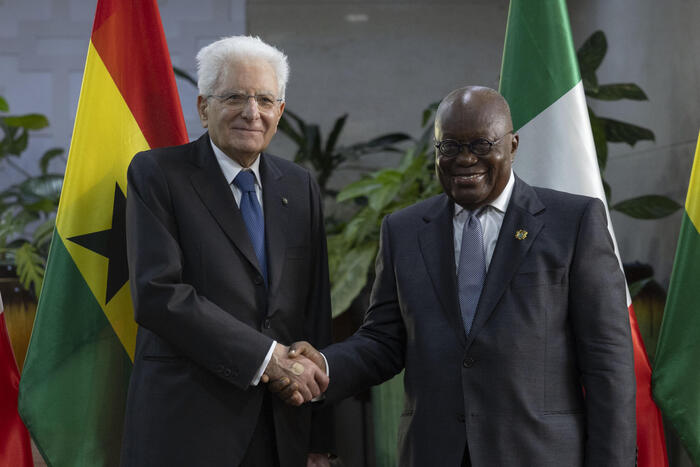With the right opportunities, women can play a critical role in Africa's social and economic development.
But which investments are the most effective in empowering more African women to seize those opportunities?
When women have more say in their own social and economic choices, their well-being and that of their households and communities improves.
Their families show progress on almost all developmental milestones.
For example, a study by the African Economic Research Consortium in Kenya examining the impact of empowerment policies on household nutritional outcomes found that the percentage of children under five who are underweight fell from 19 % to 12% between 2003 and 2014. In Nigeria, a survey of farm households links empowerment with improvements in children's cognitive development, growth and nutrition.
These benefits in households spread.
A 2018 report from the International Monetary Fund (IMF) associated greater gender equality with greater economic resilience, higher GDP per capita, lower income inequality, and higher labor productivity.
An investment in effective, evidence-based policies that empower women is therefore an investment in the overall economic future of a country.
But when African governments and their partners commit to investing in it, they must first understand which strategies produce sustained results.
Recent evaluations of various programs provide some perspective on how best to put women on a path to long-term self-sufficiency and improved well-being.
The Empowerment and Survival for Adolescents (ELA) model offers young women a combination of life skills and vocational training.
It uses mentors who provide reproductive and sexual health information and instruction in financial literacy and business management.
So far, ELA has reached more than 200,000 girls, adolescents, and youth in Uganda, Sierra Leone, South Sudan, Nepal, Liberia, and Tanzania.
A randomized controlled trial in Uganda found that young women in communities with ALS programs were “48% more likely to be involved in an income-generating activity,” mostly self-employed.
These populations also benefited from a 34% reduction in teenage pregnancies and a 62% decrease in early marriages or cohabitation.
The Empowerment and Survival for Adolescents (ELA) model has reached more than 200,000 girls, adolescents and young women in Uganda, Sierra Leone, South Sudan, Nepal, Liberia and Tanzania
Another model is Graduation, which takes a multipronged approach to tackling extreme poverty.
The program meets the basic needs of participants, often by connecting them to existing safety net projects, and then provides income-generating assets and instruction on how to manage them.
Participants also receive financial literacy instruction and life skills training.
And all components of the programs are adapted to the local context and are implemented through face-to-face training.
A growing body of evidence suggests that this model, by combining support such as cash transfers with more comprehensive initiatives, can have broader and more lasting effects than cash transfers alone.
Research in South Sudan found that both cash transfers and Graduation had positive effects on consumption, but Graduation also had a longer-term effect on participants' overall health.
Similarly, a study in Uganda showed that it allowed for an improvement in income, consumption, nutrition and subjective well-being compared to giving money alone.
NGOs, researchers and governments must work together to scale up programs that have worked and develop new ways to encourage women's self-sufficiency
In Ghana, a group of researchers studied the long-term effects of Graduation by comparing program participants with others who only received an asset transfer (goats, in this case).
The program offered agricultural jobs and training, health and nutrition information, enrollment in national health insurance, savings accounts, and a weekly training by program staff, as well as money transfers.
After three years, the value of the participants' assets, consumption and income was higher than that of those who had received only the goats.
Through this strategy, women in Kenya have been able to participate in the economy, send their children to school, improve gender relations and become leaders in their communities.
And in Uganda, young women have learned how to increase their savings, boost their productivity and improve food security for all their households.
Partnerships between non-governmental organizations, researchers and governments are crucial in moving innovative projects from pilot stage to full implementation.
In the case of Graduation, the research alliances were crucial for the expansion of the program.
Researchers monitored the project in various contexts to ensure authorities understood its effectiveness.
There were also internal and external evaluations that helped improve the tool over time, as program staff used the data to adapt their design.
The education, social inclusion and economic integration of African women will shape the future of the continent.
NGOs, researchers, and governments must work together to scale up programs that have worked and develop new ways to encourage their empowerment and self-reliance.
The future of Africa depends on it.
Ruth Okowa
is director of the Africa region of BRAC International.
Munshi Sulaiman
is head of regional research in Africa at BRAC International.
Copyright: Project Syndicate, 2022.
You can follow PLANETA FUTURO on
,
and
, and subscribe
to our 'newsletter'
here
.

/cloudfront-eu-central-1.images.arcpublishing.com/prisa/RY2S7EU5Z5DNVAKTINK4LLCUKM.jpg)






/cloudfront-eu-central-1.images.arcpublishing.com/prisa/LSI5G6FGBZCT5GWRU4GZQ5RLTA.png)
